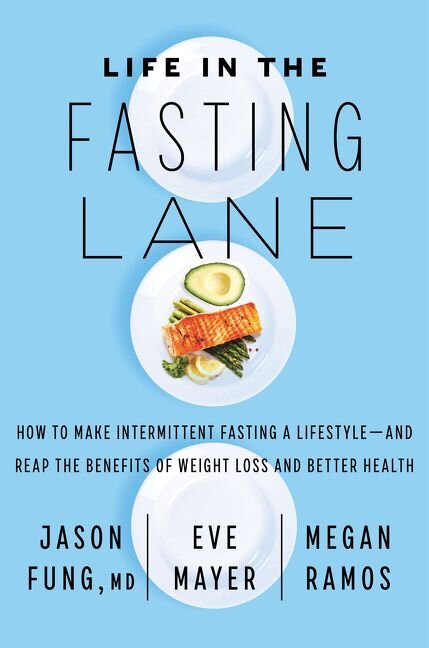The Unexaggerated Positives of Intermittent Fasting
/Many people believe that intermittent fasting is the holy grail of diets. Countless athletes and celebrities tout this eating method for its ability to shed unwanted fat and build muscle. If you believe everything you read, intermittent fasting is both the cure to cancer and heart disease and the key to making you look like Chris Hemsworth.
Intermittent fasting is defined as "an umbrella term for various eating diet plans that cycle between a period of fasting and non-fasting over a defined period." The variations are virtually endless, but one of the most popular options is fasting for 16 hours each day then feeding for 8 (which is commonly referred to as 16-8 fasting).
There are numerous impressive physiological claims floating around regarding intermittent fasting. These claims include:
Increased growth hormone secretion (enhancing muscle building)
Increased sensitivity to insulin
Initiates cellular repair
Changes gene expression
Reduces LDL cholesterol
Increased metabolic rate (specifically fat metabolism)
It all sounds great, but we must consider the fact that the research on intermittent fasting is still relatively sparse. What's there is promising, but before something can become a scientific fact, there must be a significant body of research. That takes time. Also, these considerations should be made when looking at the research we do have:
Most of the studies we have now are very promising, but have been conducted on animals (typically rats), which does not always translate to humans. (2,4,8,9,12)
Another consideration is that there are numerous types of intermittent fasting and the body could respond differently to each. Just because a study shows that 16-8 intermittent fasting increases secretions of growth hormone does not mean a different IF variation causes the same spike in growth hormone secretion. For this reason, more studies need to be done to compare the benefits of the many IF variations.
The research we have does not hit the full spectrum of ages and genders. Just because a study shows a benefit with an elderly population does not mean that it will translate to individuals in their mid-20s, and the male body may respond differently than female, and vice versa.
Health status also needs to be considered. Is this diet only effective for those who are previously unhealthy, or can these health benefits occur in trained and untrained individuals? There is some research to support its benefits across the health spectrum, but it also needs to be tested in combination with gender, age and different fasting types.
Some of the results are mixed. Most of the research I have read is positive for intermittent fasting, but some has mixed results, which must make us question why that occurred. For example, a study conducted by Varady et al found that subjects performing intermittent fasting alone had no change in LDL or HDL cholesterol levels, while Bhutani et al found a significant decrease in LDL levels when intermittent fasting was combined with exercise. (3) This would suggest that fasting must be combined with a healthy lifestyle to see all the benefits. The problem is that we do not know if the fasting had anything to do with the decrease in LDL. It could have been entirely from the exercise program, as there are countless studies that have found that exercise can reduce LDL levels. (6) This is why it is so important for further research to be conducted.
All of these points are not meant to deter you from trying intermittent fasting. The point is that just because an article cites research does not mean the claims they are making are facts, and the jury is still out on the spectrum of physiological benefits of intermittent fasting. In an age where some are touting it as a panacea, that's an important distinction.
Here's where I tell you that I believe intermittent fasting can be an incredible tool to help achieve a healthier lifestyle. My goal is to provide you with some realistic expectations of the benefits of intermittent fasting. For the remainder of this article, when I am talking about intermittent fasting, I will be referencing the 16-8 ratio, where you fast for 16 hours and feast for 8 hours of the day. I personally believe this is to be the most sustainable method of intermittent fasting (though your experience may vary). Why do I believe in intermittent fasting? Here are my four biggest reasons.
1. Lifestyle Change
The treatment and prevention of nearly any chronic disease involves lifestyle change. Most fad diets are used for a short period of time, as continuing them over the long term is often unsustainable and sometimes even dangerous. They can provide drastic results quickly, but those disappear when the diet is stopped. Since intermittent fasting doesn't restrict what you eat but rather when you eat, many people find it to be more sustainable than fad diets. You don't have to unnecessarily avoid certain food groups, and you don't have to spend time at restaurants scrutinizing the menu for something that fits your diet's strict standards. Many people who adopt intermittent fasting never go back to the typical American schedule of eating (which pretty much runs from the time you wake up right up until the time you fall asleep). I believe a "lifestyle" change will always trump a quick-fix, and intermittent fasting can check that box.
2. Creating Self-Discipline
When you are actively choosing to abstain from something daily, that takes self-discipline. Studies have shown that discipline is a skill that can be developed (7). Intermittent fasting requires discipline and will make you a more conscious eater. When you can only feed during certain periods, you will appreciate food more. I've found the discipline that can be created via intermittent fasting often trickles over to other areas of life. People who are able to maintain the self-discipline of intermittent fasting are going to be better able to maintain other healthy lifestyle choices.
3. Reduction in Calories
It is very difficult to overeat when you are only allowed to eat for 8 hours a day. This makes intermittent fasting a great way to reduce your daily caloric intake (which is the only way to lose weight) without actually counting calories. There are some studies that have found intermittent fasting and general calorie restriction produce similar results (11), but intermittent fasting may be a more enjoyable way to achieve those results. Many people are attracted to intermittent fasting because of the idea that they can "gorge" during the feeding period. But the truth is, even if you "gorge," you're going to usually end up feeling full quicker than you might imagine. You can avoid a negative caloric balance by tweaking the foods you eat and how you eat them, but generally speaking, intermittent fasting usually leads to a reduction in calories. There is a lot of evidence that Intermittent fasting may do more than just reduce your calories, but it is still an easy way to eat less without being forced to only drink lemon cayenne water or eat bananas (yes, those are real fad diets people actually attempt).
4. Cuts Down on Late-Night Snacking
Exactly when you're able to feed will depend on the type of intermittent fasting you adopt and the feeding windows you select, but most people find intermittent fasting restricts them from late-night snacking.
Now, there's nothing inherently bad about eating at night. Contrary to popular belief, food eaten at night does not turn into fat as you sleep (5). The real problem with late night snacking is that we typically gravitate toward easy junk food options like crackers, chips, cookies, ice cream, etc. beyond 9 p.m. After a long day, people just want to indulge and they don't feel like taking time to prepare something healthy. Intermittent fasting will often force you to stop eating earlier than you have traditionally, which can help those of us who struggle with late-night sweets.
A couple caveats I must mention in closing. Intermittent fasting is only beneficial as a part of a healthy lifestyle. Your results will probably be poor if you are sedentary and eat pure candy for 8 hours and fast for 16. It is not the holy grail. But it can be a useful tool to help you to achieve a healthy lifestyle. Secondly, intermittent fasting is often used as a weight-loss technique. If you're not looking to lose weight, then the diet may take additional planning and effort to be beneficial. And if you're an athlete, intermittent fasting can present a different crop of issues, particularly when it comes to the ability to fuel up shortly before and after training or competition.
This article originally appeared on Stack.com











